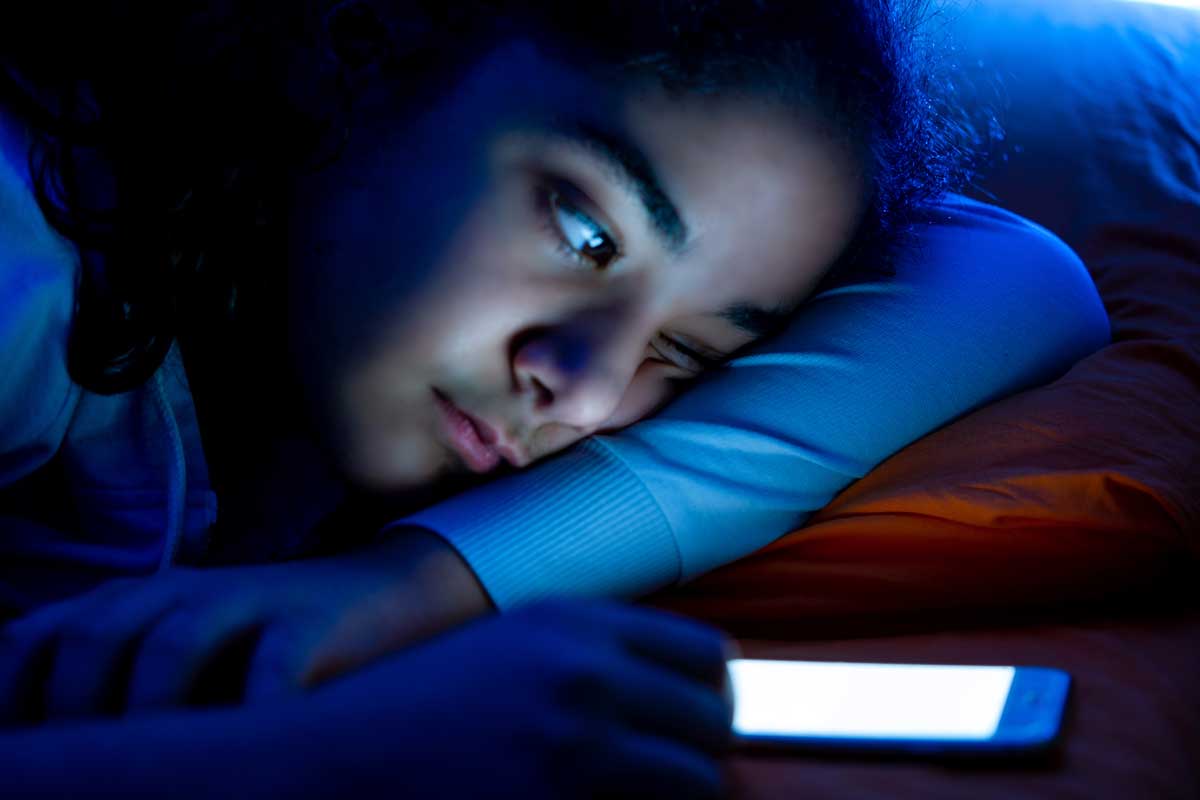New study finds that quantity of social technology use, type of content viewed, and social context significantly related to later bedtimes and less sleep for early adolescents

Wellesley, MA -- A new study published in the Journal of Adolescent Health found that checking social media often, viewing emotional or violent videos, and starting to use social media at an early age were significantly related to later bedtimes and fewer hours of sleep on school nights for early adolescents. Parental rules restricting mobile phone and online use before bed and obtaining a smartphone at a later age were associated with increased sleep duration and earlier bedtimes.
“We need to move beyond the sole focus on the amount of time adolescents spend on technologies before bed,” said the study’s lead author Linda Charmaraman, Ph.D., director of the Youth, Media and Wellbeing Research Lab at the Wellesley Centers for Women (WCW). “Understanding the bedtime habits and online content that negatively affect sleep helps us design more effective interventions for parents and practitioners to encourage healthier social technology use. This study is a first step in that direction.”
As part of the Adolescent Social Media Use, Health, and Parental Monitoring Study, Charmaraman and her co-authors surveyed 772 6-8th grade students from four schools in the Northeast U.S. between February and June 2019. The survey asked questions about social media, internet, and phone use, content of websites and social media posts, behaviors within one hour of bedtime, bedtime, sleep duration, and phone/screen restrictions put in place by parents.
Controlling for potential confounding factors such as gender, age, race/ethnicity, two-parent household, and eligibility for free or reduced price lunch, the researchers found that more frequently engaging in checking social media, problematic internet behaviors, fear of missing out (FoMO), problematic digital technology use, and watching more emotional or violent videos were significantly related to later bedtimes and fewer hours of sleep on a typical school night. Participants who acknowledged losing sleep because they couldn’t quit online activities went to bed later and slept less. Seeing posts related to a thin ideal weight was significantly associated with reduced sleep, and seeing messages related to drugs/drinking was significantly related to later bedtimes. Watching YouTube videos before sleep was related to later bedtimes and reduced sleep; checking social media before bed was related to later bedtimes. Reading books was the only bedtime behavior associated with an earlier bedtime.
“Reduced sleep is associated with many adverse physical, emotional, and educational outcomes,” said Elizabeth B. Klerman, M.D., Ph.D., of the Massachusetts General Hospital, senior author of the study. “The results of this study provide evidence of modifiable factors that negatively affect sleep duration. Individuals (e.g., children, parents, practitioners, teachers) and communities can work to change behaviors that affect sleep.”
The article was also co-authored by Amanda M. Richer, M.A., research associate and assistant methodologist at WCW, and Elana Pearl Ben-Joseph, M.D., M.P.H., pediatrician and medical editor for Kids Health at the Nemours Center for Children’s Health Media, and visiting scholar at WCW.
The study was funded by the Eunice Kennedy Shriver National Institute of Child Health & Human Development of the National Institutes of Health (NIH), under award number R15HD094281-01, with support from Children and Screens: Institute of Digital Media and Child Development to pilot the measures and procedures that lead to the subsequent NIH funding. Funding to support data discussion and analyses was provided by the NIH National Heart, Lung, and Blood Institute (K24-HL105664-10) to Dr. Klerman. The content is solely the responsibility of the authors and does not necessarily represent the official views of the National Institutes of Health.
About the Wellesley Centers for Women
The Wellesley Centers for Women (WCW) is the largest academic research and action institute in the United States that is focused on women and gender and driven by social change. WCW is located at Wellesley College. Research scientists and project directors at WCW advance gender equality, social justice, and human wellbeing through high-quality research, theory, and action programs. Areas of work include: Education, Economic Security, Mental Health, Youth and Adolescent Development, and Gender-Based Violence.
November 2, 2020

